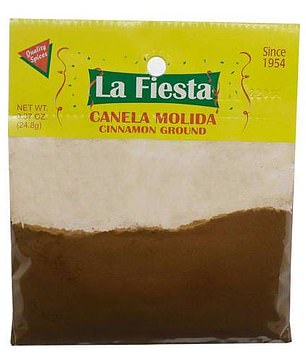The FDA warns that an unsuspecting product likely on YOUR spice rack could contain a toxic metal
The cinnamon in your spice rack may contain toxic levels of the metal, health officials have warned.
The FDA believes the lead contamination problem is more widespread than the cinnamon applesauce bags that were recalled in October.
The agency announced Wednesday that it had sent a letter to all cinnamon manufacturers, processors, distributors and operators of cinnamon facilities in the U.S. reminding them of their responsibility to prevent contamination.
Spices can become contaminated with lead in many ways, including from the soil in which they are planted, old equipment or pipes containing lead in the factory where it was processed, or from the intentional addition of lead.
It also tested brands of ground cinnamon from discount stores and analyzed those samples for lead and chromium. Based on its testing, the FDA has recommended a recall of ground cinnamon from six brands.
Based on its testing, the FDA has recommended a recall of ground cinnamon from six brands, including Supreme Tradition, sold at Dollar Tree and Family Dollar.


Brands recalled by the FDA also include La Fiesta, lot 25033, sold at La Superior SuperMercados, and El Chillar, F275EX1026 and D300EX1024, sold at La Joya Morelense in Baltimore, Maryland.
More than 460 young people in 44 states became ill after consuming cinnamon applesauce bags contaminated with “extremely high” levels of lead, sold under the brands WanaBana, Schnucks or Weis and flavored with cinnamon imported from Ecuador.
Lead exposure has been shown to seriously harm children’s health, slowing growth and development and causing damage to the brain and nervous system.
Parents of children poisoned by toxic lead in baby fruit pouches have revealed that their children now suffer from speech delays, dark circles and behavioral problems.
Alyssa Magnuson, a 29-year-old from Minnesota, took her then 11-month-old daughter Stevie for a routine blood test last fall and was in “disbelief and shock” when her child’s lead levels were more than 16 times higher than the normal blood test. the safe border.
Doctors also alerted Sarah Callahan, 39, of Maryland, that her 18-month-old son, Rudy, was showing signs of speech delay. He had been eating WanaBana pouches since that spring.
Ms. Callahan told NBC News that when she took Rudy for his one-year checkup last year, his blood lead levels were 19.8 micrograms of lead per deciliter. This is more than five times the limit that the FDA has deemed safe.


Alyssa Magnuson (left) told NBC she was “in disbelief and shocked” when her daughter Stevie’s lead levels were more than 16 times the average for children
The brands of ground cinnamon recalled by the FDA are: La Fiesta, sold at La Superior SuperMercados, Marcum, sold at Save A Lot, MTCI, sold at SF Supermarket, Swad, sold at Patel Brothers, Supreme Tradition, sold at Dollar Tree and Family Dollar and El Chillar, sold at La Joya Morelense in Baltimore, Maryland.
“Removing the ground cinnamon products in this warning from the market will prevent them from contributing large amounts of lead to children’s diets,” the FDA said.
Retailers should stop using them and consumers should throw away any products they have at home, the agency said.
No illnesses or other health effects have been reported in connection with the new warning for ground cinnamon, the FDA said.
The lead content in the ground cinnamon products was much lower than the amount in some cinnamon applesauce bags, but the FDA said prolonged exposure could be harmful over time.
According to the FDA, the lead concentration in the ground spice ranged from 2 to 3.4 parts per million.
Meanwhile, lead concentrations in the cinnamon applesauce bags were thousands of times higher: between about 2,300 parts per million and about 5,100 parts per million.
The majority of people will not have any obvious symptoms of lead exposure at first.
The FDA has recommended that people who may have been exposed to high levels of lead should talk to a healthcare provider.
A review of 17 studies found that lead exposure early in life is linked to a higher risk of criminal behavior in adulthood.
The metal is toxic to the body and has been linked to a host of health problems, including kidney disease, infertility and delays in mental development.
Dr. Jennifer Sample, a pediatric toxicologist, told the Associated Press that there is no amount of lead exposure that is safe for children, and the effects on brain development can occur years later.
‘It’s irritability. They are behavioral problems. They are learning disabilities,” she said.
Lead travels through the bloodstream and builds up in soft tissue, such as the kidneys, liver and lungs, which can lead to problems for these organs over time.
Over time, this can lead to lower IQ, reduced ability to pay attention, and underachievement in school for children.
